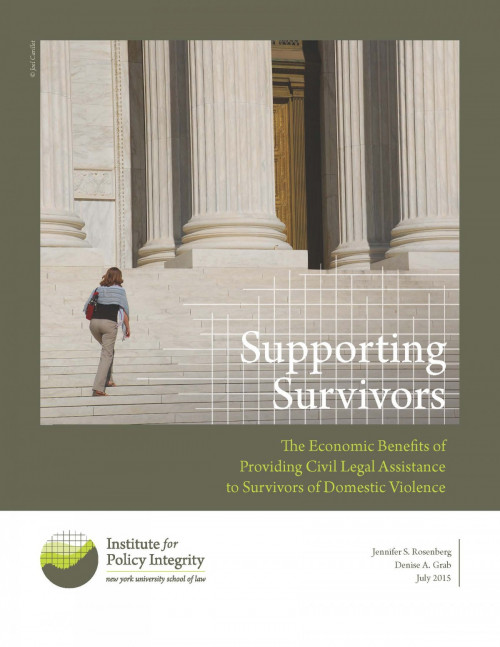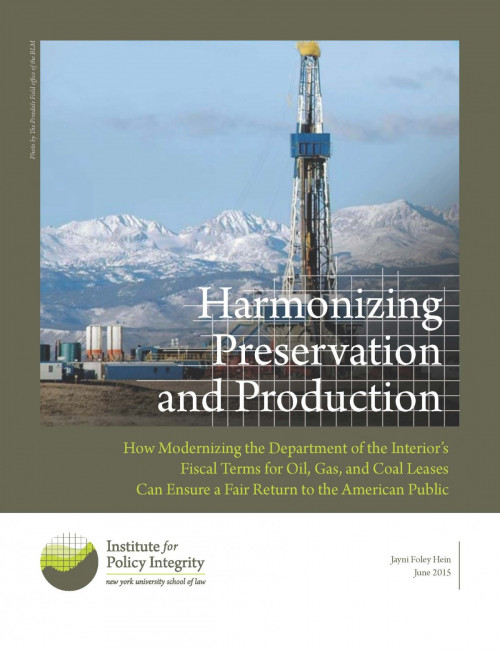-
Comments on New York State’s “Reforming the Energy Vision” Initiative
We recently submitted comments to the New York State Public Service Commission regarding the Reforming the Energy Vision (REV) initiative, which seeks to spur clean energy innovation and improve consumer choice and affordability in New York State. The Commission sought comments on how best to develop a cost-benefit analysis framework to evaluate utility proposals within the REV and related proceedings. Our comments addressed the consideration of externalities and the social cost of carbon in the Commission’s cost-benefit analysis.
-
Policy Integrity Weighs in on Federal Coal Program
Jayni Hein, our policy director, recently participated in the Department of the Interior’s (DOI’s) inaugural listening session on the federal coal program. Hein provided recommendations for modernizing the fiscal terms of federal coal leases at this Washington D.C meeting, held on July 29th. DOI organized the event to solicit input from the public about how the the agency can best carry out its responsibility to ensure that American taxpayers receive a fair return on the coal resources managed by the federal government on their behalf. Secretary of the Interior Sally Jewell attended the listening session.
-
Legal Brief on the Social Cost of Carbon
We recently filed an amicus brief in a federal court case challenging the U.S. Department of Energy’s (DOE’s) new efficiency standards for commercial refrigeration equipment. The case, Zero Zone Inc. v. U.S. Department of Energy, will be heard by the U.S. Court of Appeals for the Seventh Circuit.
-

Supporting Survivors
The Economic Benefits of Providing Civil Legal Assistance to Survivors of Domestic Violence
Evidence indicates that the social costs of domestic violence extend far beyond the private costs borne by victims and their immediate families. Supporting Survivors analyzes the social costs of this public health problem and explores civil legal aid efforts, which have been shown to reduce rates of domestic violence by helping victims obtain protective orders and other services.
-
Helping NYC Reach a Clean Air Milestone
New York City reached an environmental milestone today as the final deadline passed in a multi-year effort to eliminate the city’s dirtiest residential heating oils. Policy Integrity played a major role in shaping and supporting the NYC Clean Heat program, which has saved hundreds of lives by curbing air pollution.
-
Supreme Court Sends EPA’s Mercury Rule Back to Circuit Court for Additional Review
Today, the Supreme Court ruled that the Environmental Protection Agency (EPA) did not consider costs at the appropriate stage of the regulatory process before crafting the Mercury and Air Toxics Standards. This rule, which regulates toxic emissions from power plants, will now be sent back to the U.S. Court of Appeals for the D.C. Circuit, where the judges will decide how the EPA should proceed.
-
Court Rejects Initial Challenges to Clean Power Plan
Today, the U.S. Court of Appeals for the D.C. Circuit dismissed the first challenges to President Obama’s signature climate change initiative—the EPA’s Clean Power Plan. In the ruling, the judges said they would not take the unprecedented step of blocking the EPA’s regulation before a final rule has even been issued.
-

Harmonizing Preservation and Production
How Modernizing the Department of the Interior’s Fiscal Terms for Oil, Gas, and Coal Leases Can Ensure a Fair Return to the American Public
Leasing federal lands for drilling and mining generates a huge amount of revenue for the United States, but the Department of the Interior, which oversees these leases, uses an antiquated fiscal system that deprives taxpayers of hundreds of millions of dollars. Our report analyzes how the fiscal terms for oil, gas, and coal leases could be modernized to ensure a fair return to the American public.
-
Consumer Product Safety Commission Public Comments
Since 1996, there have been at least 285 incidents of child strangulation by window covering cords. The Consumer Product Safety Commission is considering a regulation to address this issue, and we recently submitted public comments on the Commission’s advance notice of proposed rulemaking. We offered a number of suggestions for improving upon the Commission’s preliminary analysis of the costs and benefits of eliminating cords from window coverings. These included recommendations that the Commission consider the prevention of parental grief as an unquantified benefit of regulation and that it perform separate cost-benefit analyses for each major category of covering (e.g., vinyl blinds, wood blinds, roman shades).
-
Regulatory Report on Oil Dispersants
Our new regulatory report offers guidance on how how the EPA can improve its cost-benefit analysis for a new proposed rule regulating the dispersants used to clean up oil spills and other major pollution events.
